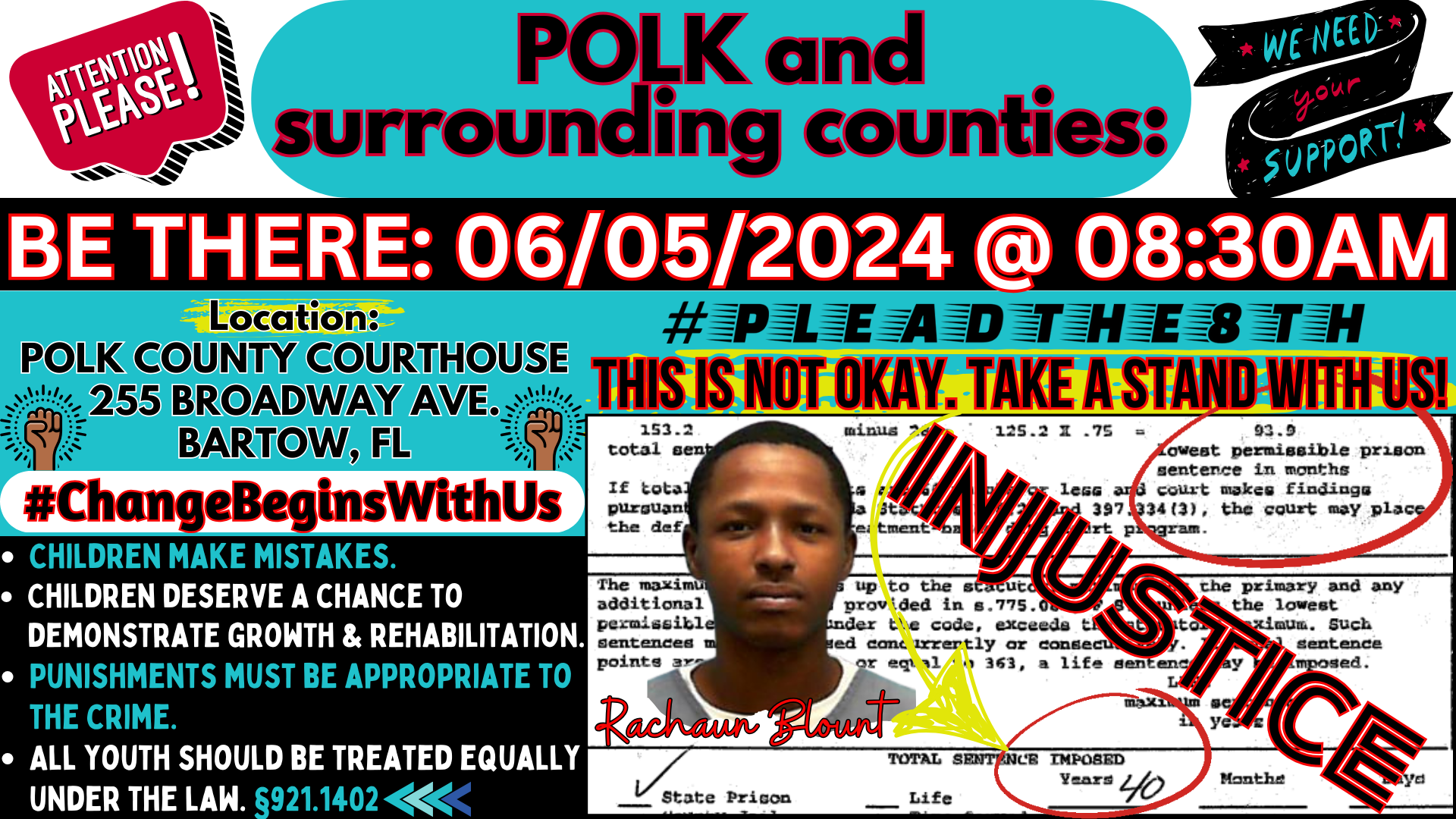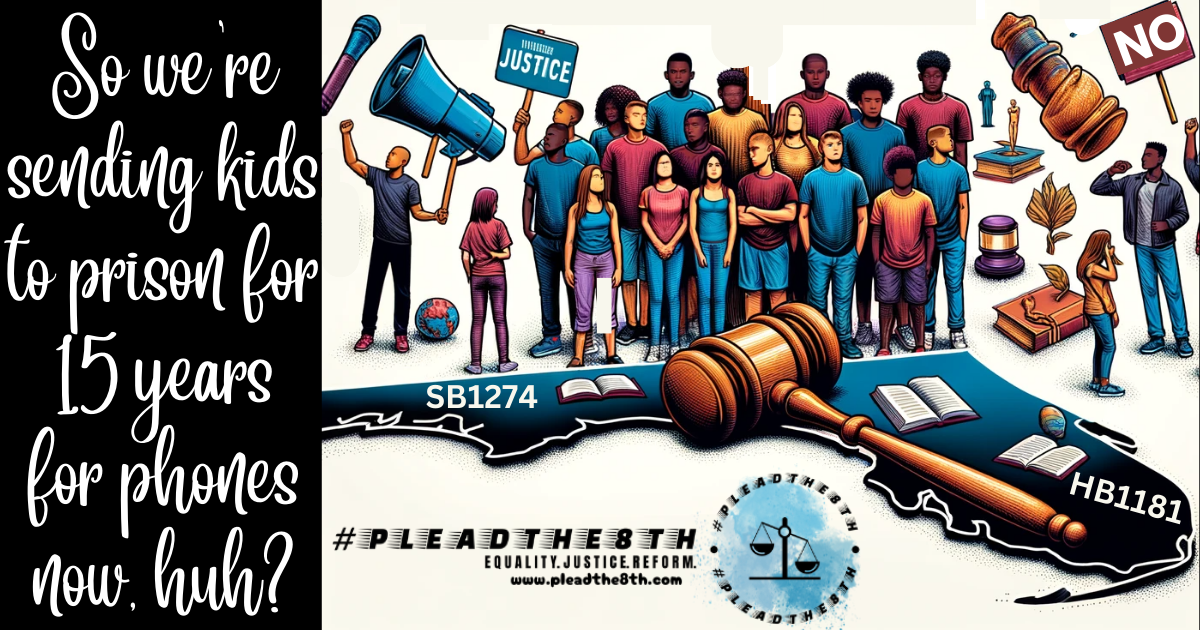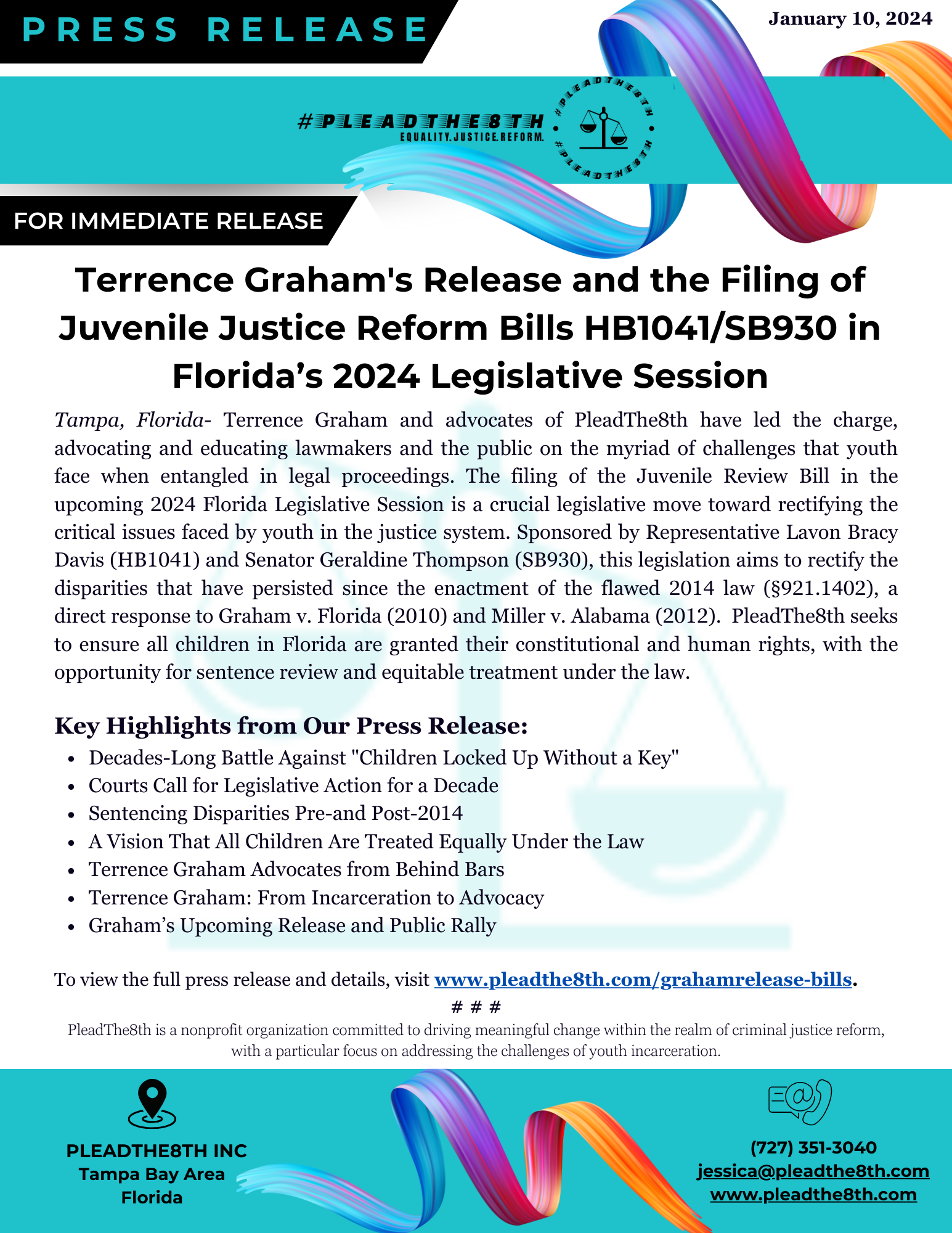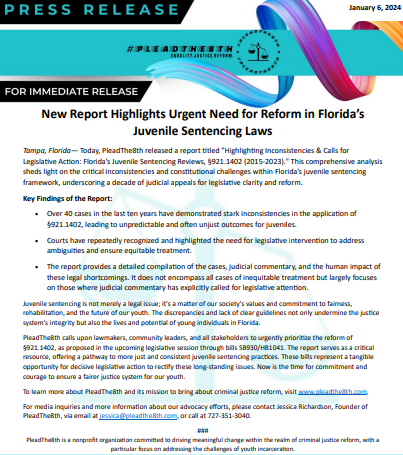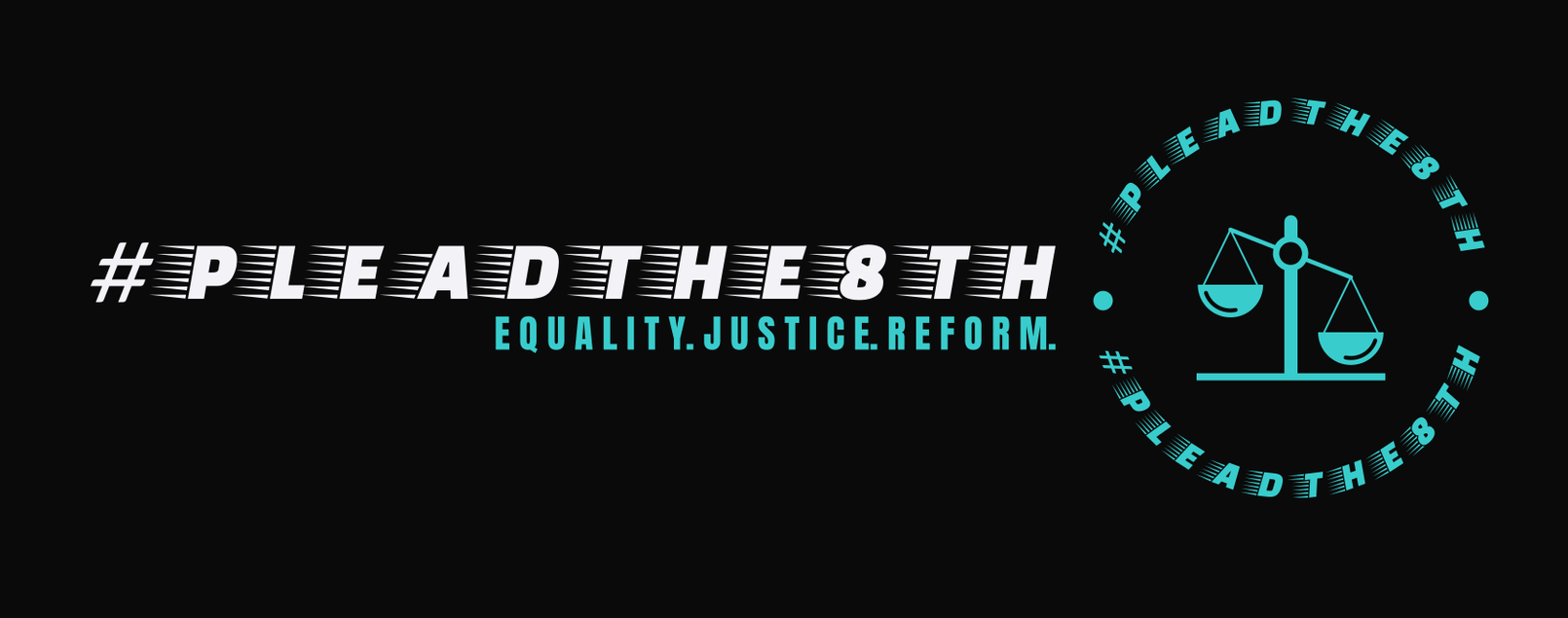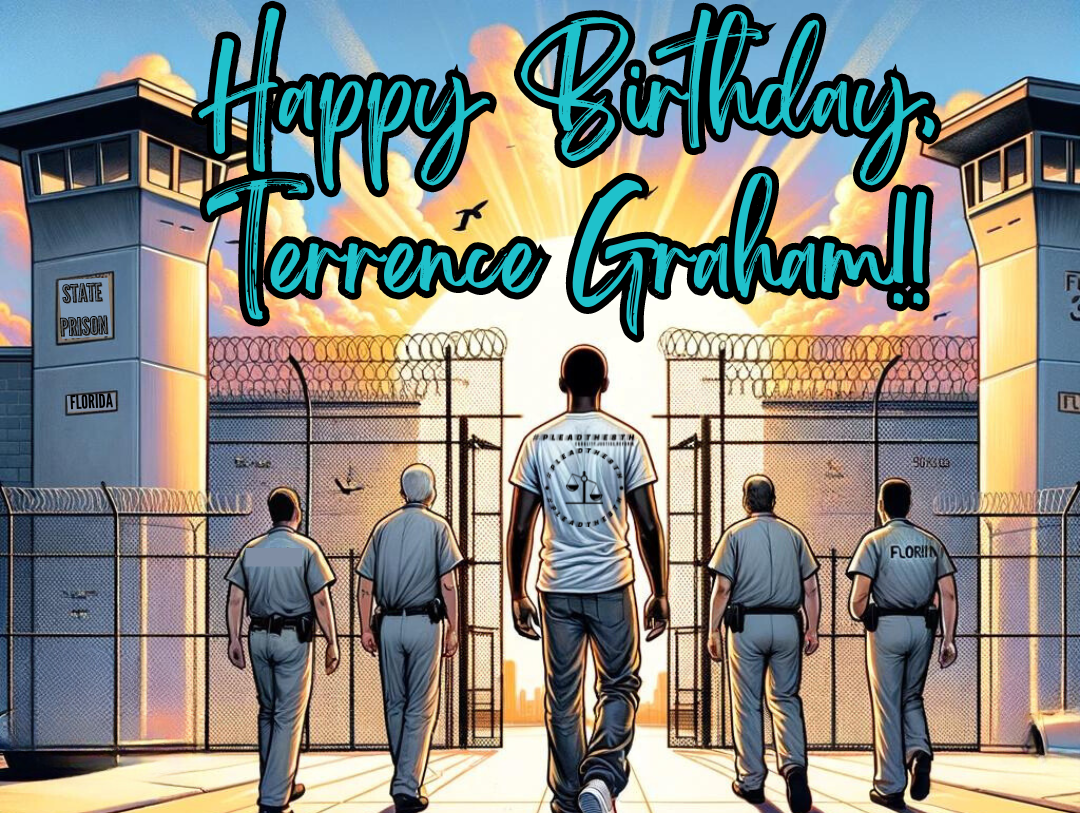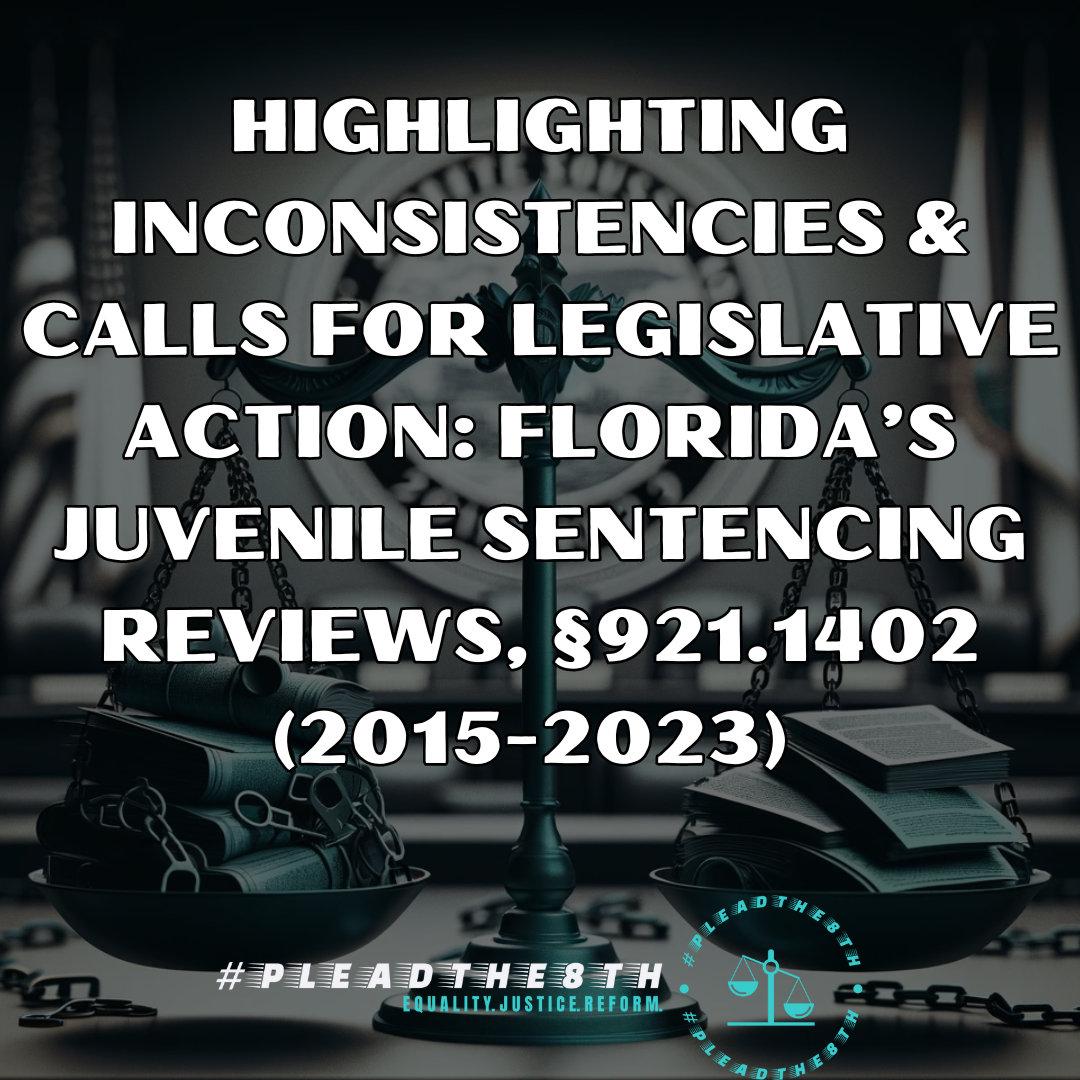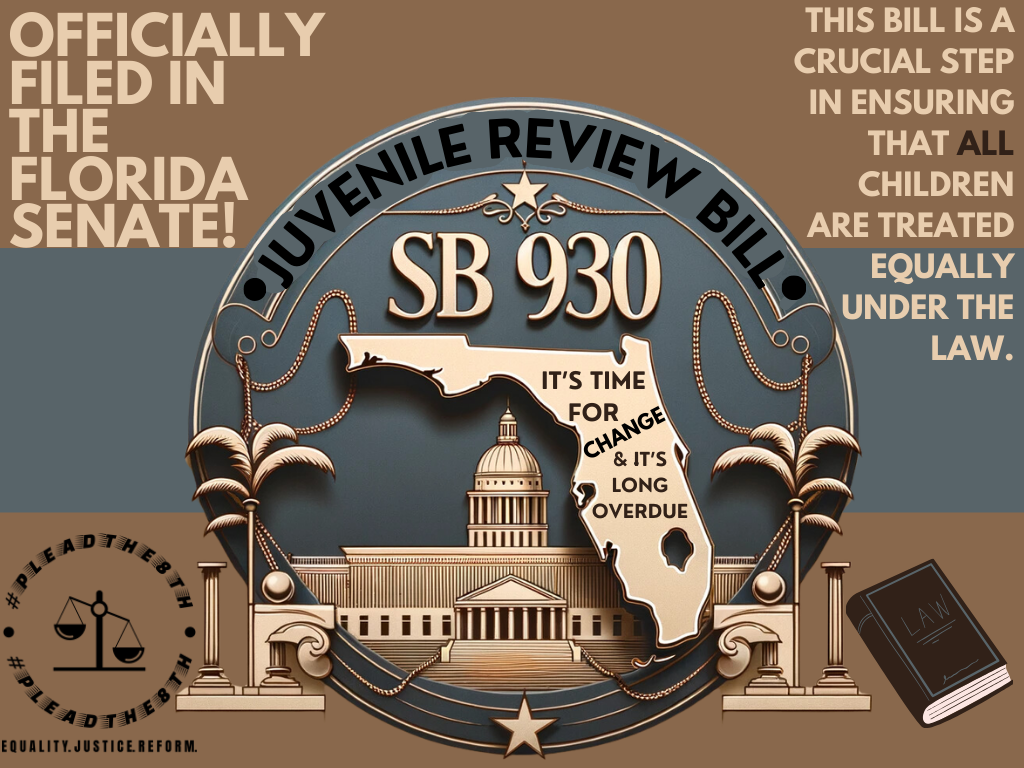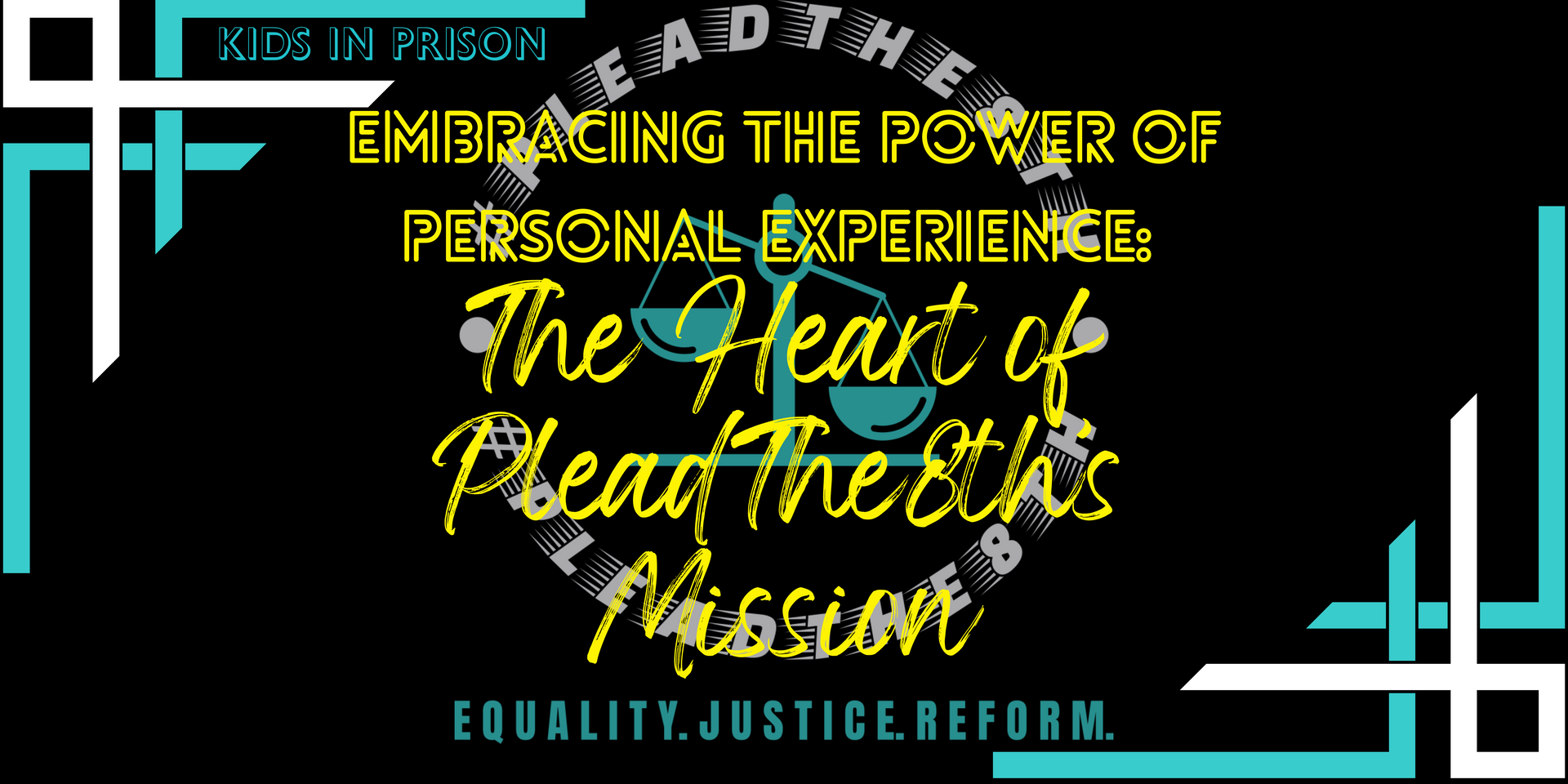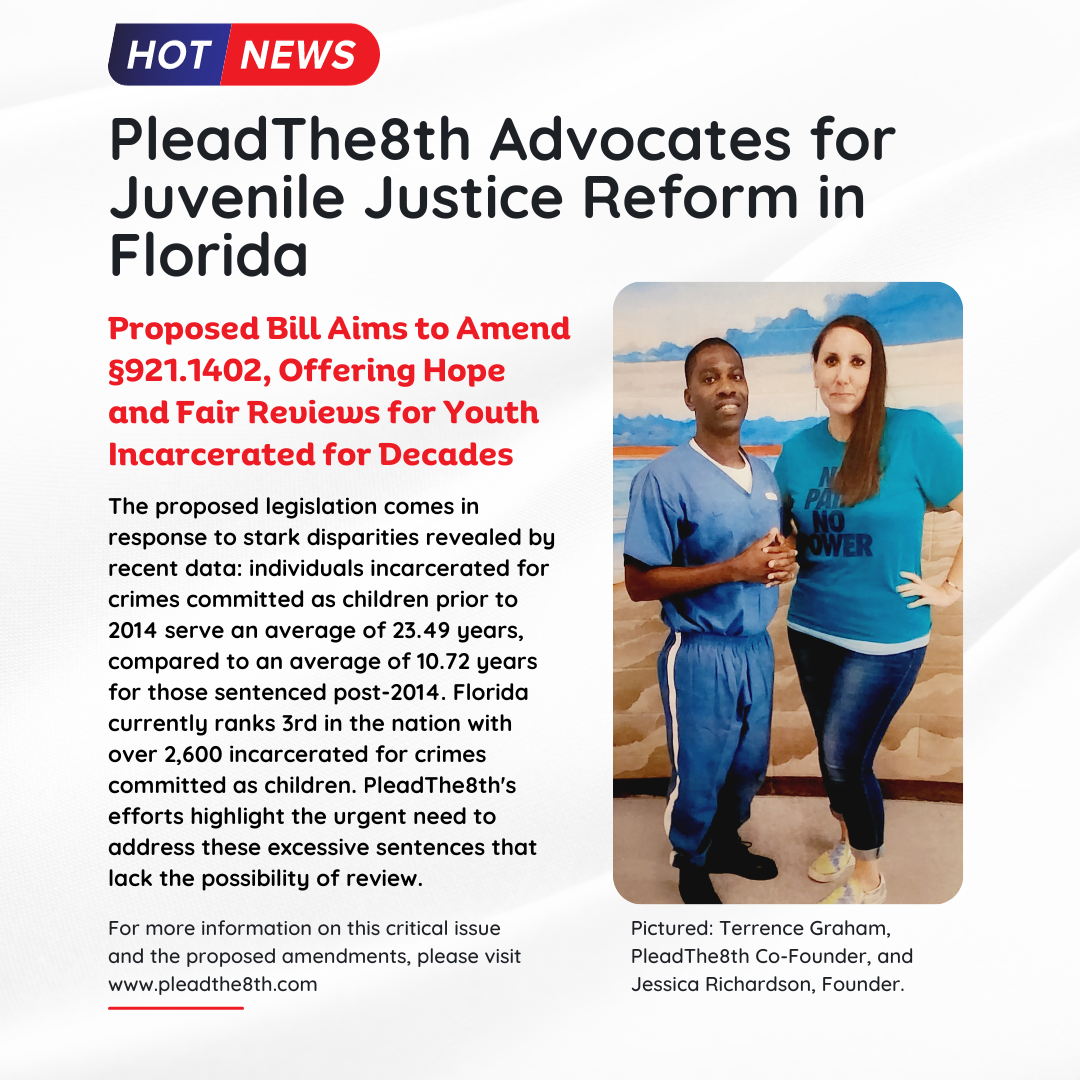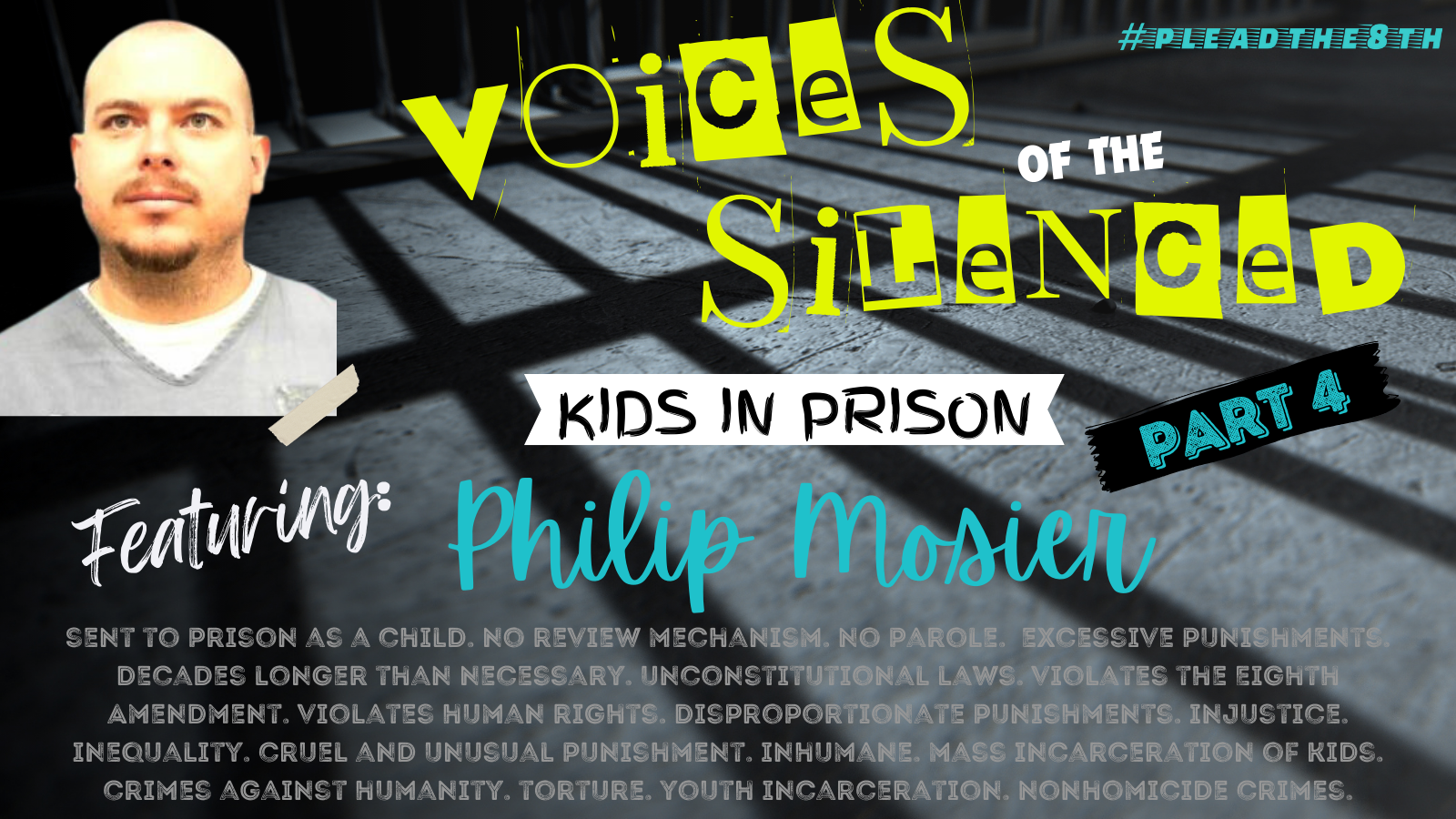Kids in Prison:
Don't send kids to prison and throw away the key!
Florida is doing just that.
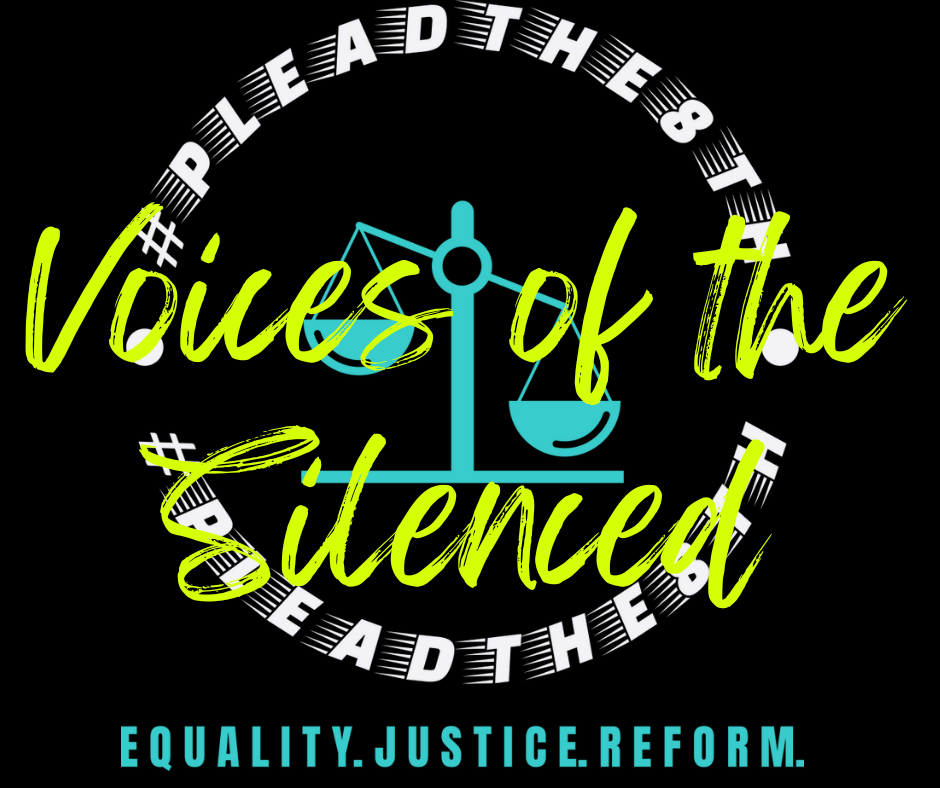
Kids that were sent to prison during the "tough on crime" and "super predator" era have been forgotten and disregarded in the state of Florida.
Prison populations across Florida continue to rise and our Governor and lawmakers seem to conclude that providing the Department of Corrections more money is the solution to the prison overpopulation and lack of staff crisis. The Florida prison system has grown 300% in the last 20 years. Florida houses more prisoners than many countries and is the 3rd largest prison system in the US, behind Texas and California. The United States imprisons over 2 million people, more than any other country in the world.
Florida has been #1 in the United States in sending kids to prison for many years.
In 2016, reports state that Florida transferred more youth to adult court than Texas, California, Michigan, North Carolina and Pennsylvania combined. In 2020-2021, 61% of children transferred to adult court were black. Many system-involved children in Florida receive excessive and disproportionate sentences due to racism and bias. Furthermore, Blacks are 17% of Florida's total population, yet those of color make up about 55% of Florida's prison population. Those of color are not only transferred to adult court at higher rates than whites, but they are also subjected to much longer punishments than their white counterparts, for the same crime.
Florida should start with kids that were sent to prison with unjust, excessive, and disproportionate sentences that have no review mechanism.
Due to Florida's ambiguous and unfair laws, many kids are in prison with excessive, disproportionate sentences that have no opportunity to have a review hearing. Yet, many juveniles that committed more serious crimes unfairly have that opportunity. Lawmakers should address the inequality and injustices of the current laws, rather than providing more funding to the Department of Corrections for raises or discussing building more prisons. Florida currently has over 2,600 incarcerated for crimes committed as a child.
Excessive and disproportionate punishments.
Perhaps when you hear "disproportionate punishment" you think someone committed a crime and got "a few years" longer than they expected? In Florida, children have been punished decades longer than necessary. Not a decade, but "decades" with an "s," as in plural. In some cases, 20-40 years longer than one would expect. Decades longer than their crimes warranted, their sentencing scoresheets recommended, their PSI reports entailed, the state averages depicted, and the mandatory minimums stated. Hundreds of individuals are currently in Florida prisons for non-homicide crimes they committed as a child, with 20-, 30-, and 40-year punishments.
In most countries, sending kids to prison with excessive punishments and no review mechanism would be a human rights violation, based on the UN Convention on the Rights of a Child.
The United States is the only country in the United Nations that has not ratified the UN Convention on Child Rights, so the US continues to subject kids to harsh, cruel, and unusual punishments. Per the Convention, kids must have proportionate sentences, the lowest permissible punishment, and review mechanisms to name a few. We are failing to protect kids as a state and as a country.
In 2010 and 2012, the United States Supreme Court ruled in Graham & Miller that juveniles cannot be sentenced to life in prison for non-homicide or homicide crimes without a review mechanism, as this was unconstitutional and violates the Eighth Amendment.
A, or perhaps "THE," key component in these Supreme Court cases was that the kids were sentenced to extreme punishments without a review mechanism. The Supreme Court ruled that kids must have a review mechanism so they can "demonstrate maturity and rehabilitation." In 2016, the United States Supreme Court ruled in Montgomery that states must apply this retroactively to allow reviews of children who were sentenced before the ruling was made.
States then struggle on how to apply these rulings.
Graham & Miller both had life without parole sentences, so Florida then struggles with how to apply the rulings to those with terms of years sentences. Does this mean that ALL kids should have reviews? Does this mean that only those sentenced to life without parole get reviews? Does this mean that defacto life get a review? What constitutes defacto life? Does this mean that any sentence without parole gets a review?
Florida enacted §921.1402 in 2014 to comply with the US Supreme Court rulings.
This law allows and specifically "defines a juvenile" as those who were "under 18 and that committed crimes on or after July 1, 2014," sentencing reviews after certain time periods. Although not indicated in the language of the law, states must allow retroactive sentencing reviews, per Montgomery, for those with life without parole sentences for crimes that were committed prior to the effective date of §921.1402. Despite the effort, the selective nature of the language has made this law a major failure in providing children equality, justice, and protecting their human rights.
Florida courts can't seem to consistently or fairly apply the rulings.
Many Florida courts ruled in favor of §921.1402 applying to ALL kids for a several years, but then changed their position on the matter in 2020. Currently, only "some" kids get a review in the Sunshine State. The back-and-forth rulings in the Courts over the last (almost) 10 years is borderline comical; However, there is absolutely nothing comical about treating kids unfairly, violating their constitutional rights, inequitable laws, incarcerating children decades longer than necessary, and the evidenced racism in the justice system. Furthermore, 74.1% of the over 2,600 incarcerated since childhood in Florida are of color.
Being number 1 in the country in direct filing youth to adult court is not something to brag about.
Florida has taken "some" preventative strides to reduce the number of children sent to adult court and ultimately to adult prison over the last few years. Statistically, Florida has decreased the number of direct files to adult court. Additionally, youth that currently enter the justice system are entitled to a sentencing review hearing per §921.1402, which is not afforded to those who committed crimes prior to 2014.
More information on the various other issues with system-involved youth can be found on our website. Our current focus area being those who committed crimes before 2014 that are locked up decades longer than necessary and excluded from the current law with no hope for a review. Literally locked up with no key. ❌🔑
-------------------------------------------------------------------------------------------------------------------------------------------------------------------
Florida holds the number 3 spot in the country, with over 2,600 individuals currently incarcerated since childhood, just behind Texas and California.
-------------------------------------------------------------------------------------------------------------------------------------------------------------------
💭THE QUESTION: So, what is Florida doing for the kids they sent to prison the last two decades with unjust, disproportionate, and excessive sentences that lack a review mechanism? 🤔
Nothing. Florida is doing absolutely nothing for kids they've unjustly sent to prison for decades longer than necessary. Nor are they doing anything about their inequitable laws that only allow "some" children a review. Courts have urged the Legislature to address the issue of those with term of years sentences prior to 2014 in §921.1402 numerous times, yet nothing has been done.
-------------------------------------------------------------------------------------------------------------------------------------------------------------------
◻ By the way: Everyone in prison is not a murderer. Everyone in prison didn't hurt someone.
For the people in the back, everyone in prison did not murder or hurt someone. Many of these children with 20, 30, 40 years, and even life sentences, didn't harm anyone. In most cases, the punishments imposed upon these children are in no way proportionate to the crimes that were committed.
◻ If you believe that the justice system treats everyone fairly, then you are part of the problem.
Take a look at the Sarasota Herald Tribunes Bias on the Bench report. Numerous Judges in the state of Florida have up to a 400% sentencing spread between Blacks and Whites. Those of color receive up to 60% longer punishments than Whites for the exact same crime and with the exact same scoresheet totals.
==============================================================
- Is it the Florida Legislatures intent to only exclude juveniles that committed crimes before July 1, 2014?
- Is it fair to allow juveniles that committed more serious crimes the right of a review hearing, while excluding some with less serious crimes due to an effective date? According to current law, some homicide crimes could be eligible for a review before someone that was sentenced for a non-homicide crime.
- Is it the Florida legislatures intent to have blatantly inequitable laws that allow some kids a review and not others?
- Is it the Legislatures intent to turn a blind eye on this issue? §921.1402 was enacted in 2014. We are approaching a decade of unequal treatment of children. It is noted over and over again in court documents that the Legislature needs to address this issue.
- Is it the Legislatures intent to violate a child's human rights? The only reason this is allowed is because the UN Convention on Child Rights has not been ratified by the US, there is no national law at this point for juvenile sentencing reviews, and the US Supreme Court has not yet fully addressed the issue of term of years sentences without a review mechanism.
- Is it the Legislatures intent to only exclude kids with 20, 30, 40-year sentences that committed crimes before July 1, 2014, while others after the date are entitled to reviews?
- Why would a juvenile non-homicide offender not be entitled to a review, if a homicide offender is?
- Why would John that received a 30-year sentence for a crime on July 1, 2014, get a review, while Jayden that received a 30-year sentence for a crime on June 30, 2014, not get a review?
- Why do two people that committed the same crime have drastically different punishments?
- Why does the Black kid get 40 years and the White kid gets 5 years if they committed the same crime and had the same exact scoresheet points?
- Why is any child sentenced in a court of law without any type of review mechanism?
- Why are children being sentenced ABOVE mandatory minimums?
- Why are children being sentenced ABOVE sentencing scoresheets?
- Why are children being sentenced ABOVE state averages?
- Why are children not receiving the lowest permissible sentence?
- How do we help those currently in prison with unjust sentences for crimes they committed as children? Florida should start with looking at §921.1402. All kids should be entitled to a review hearing and laws should be equitable for all youth.
It is clear that §921.1402 should be extended to all juveniles without a review mechanism, despite what the sentence length may be. The inequitable treatment of children and the blatant selectivity of this law is incomprehensible and why this has not been addressed by Florida lawmakers is unfathomable.
==============================================================
Are we in America? Is this how we treat people? Is this how we treat children? Do we lock children up and throw away the key? Do we send children to prison for 30 years longer than warranted? Do we send children to prison for 27 years for standing at a door? Did you make a mistake as a teen? Do we send kids to prison without any type of review mechanism? Is this how you teach your children to treat people? Is this how you would want your child treated? Are you the same person you were 20 years ago? This is preposterous.
Dear Florida,
➡ STOP SENDING KIDS TO PRISON AND THROWING AWAY THE KEY! ⬅
➡ REVIEW THE KIDS! ⬅


Mr. Terrence Graham recommends this book that further discusses juveniles in the justice system.
Amazon Affiliate. Paid ad.
Leave us a comment.
Share our Blog!
Voices of the Silenced:
Check out our other blogs!
Kids in Prison: Voices of the Silenced. #PleadThe8th
